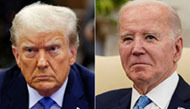▶ Believers Who Invest In the Gospel of Getting Rich
By LAURIE GOODSTEIN
FORT WORTH, Texas
ONSTAGE BEFORE thousands of believers weighed down by debt and economic insecurity, Kenneth and Gloria Copeland and their all-star lineup of “prosperity gospel” preachers delighted the crowd with anecdotes about the luxurious lives they had attained by following the Word of God.
Private airplanes and boats. A motorcycle sent by an anonymous supporter. Vacations in Hawaii and cruises in Alaska. Designer handbags. A ring of emeralds and diamonds.
“God knows where the money is, and he knows how to get the money to you,” preached Mrs. Copeland, who was dressed like a C.E.O.
Even in an economic downturn, preachers in the “prosperity gospel” movement are drawing sizable, adoring audiences. Their message - that if you have sufficient faith in God and the Bible and donate generously, God will multiply your offerings a hundredfold - is reassuring to many in hard times.
The preachers barely acknowledged the recession, though they did say it was no excuse to curtail giving. “Fear will make you stingy,” Mr. Copeland said.
But the offering buckets came up emptier than in some previous years, said those who have attended before.
The crowd of more than 9,000 was multiracial, from 48 states and 27 countries. The Copelands’ ministry, whose income is about $100 million annually, is broadcast to 134 countries.
Many in this flock do not trust banks, the news media or Washington, where the Senate Finance Committee is investigating whether the Copelands and other prosperity evangelists used donations to enrich themselves and abused their tax-exempt status.
But they trust the Copelands, who seem to embody prosperity with their robust health and abundance of children and grandchildren who have followed them into the ministry.
“If God did it for them, he will do it for us,” said Edwige Ndoudi, who traveled with her husband and three children from Canada for the Southwest Believers’ Convention this month, where the Copelands and others took turns preaching for five days, 10 hours a day, at the Fort Worth Convention Center.
“The folks who are coming aren’t poor,” said Jonathan L. Walton, a professor of religion at the University of California, Riverside, who has written about the movement and was there doing research. “They reside in that nebulous category between the working and the middle class.”
Stephen Biellier, a trucker from Mount Vernon, Missouri, said he and his wife, Millie, had come to the convention praying that this would be “the overcoming year.” They are $102,000 in debt, Mrs. Biellier said.
They say the Copelands rescued them from financial failure 23 years ago, when they bought their first truck at 22 percent interest and had to rebuild the engine twice in a year.
Around that time, Mrs. Biellier first saw Mr. Copeland on television and began sending him 50 cents a week. “We would have failed if Copeland hadn’t been praying for us every day,” she said.
The Bielliers are among 386,000 people worldwide whom the Copelands call their “partners,” most of whom send contributions and merit special prayers from the Copelands.
But Professor Walton called the prosperity preachers “spiritual pickpockets.” He added: “To dismiss and ignore the harsh realities of this economic crisis is beyond irresponsible, to the point of reprehensible.”
The Copelands refused an interview request, but one of their daughters, Kellie Copeland Swisher, and her husband, Steve Swisher, who both work in the ministry, spoke for them.
Mrs. Swisher said the ministry gave away “a minimum of 10 percent of what comes in” to other charities. Her father’s current favorite, she said, is a Roman Catholic orphanage in Mexico.
The Senate committee, as part of its tax inquiry, has asked for documents from the ministry. The ministry has resisted the request, Mrs. Swisher said, because the Copelands do not want to publicly reveal the names of its “partners.” The investigation, which could result in new laws, is continuing, a committee spokeswoman said. Among those being investigated is Creflo Dollar, one of the ministers at the Copelands’ convention.
Mr. Swisher said that even in the economic downturn, the ministry’s income going into the convention was up 3 percent over last year. Asked if the Copelands had adjusted the message for the economy, Mrs. Swisher said: “The message they preach is the Word of God. The Word doesn’t change.”
At the convention, the preachers - who also included Jesse Duplantis and Jerry Savelle - sprinkled their sermons with put-downs of the government, the news media and other churches, many of which condemn prosperity preaching.
But mostly the preachers were working mightily to remind the crowd that they are God’s elect. “While everybody else is having a famine,” said Mr. Savelle, a Texas televangelist, “his covenant people will be having the best of times.”
“Any time a worried thought about money pops up in your mind,” Mr. Savelle continued, “the next thing you do is sow”: drop money, like seeds, in “good ground” like the preachers’ ministries. “Stop worrying, start sowing,” he added, his voice rising. “That’s God’s stimulus package for you.”
At that, hundreds streamed down the aisles to the stage, laying envelopes, cash and coins on the carpeted steps.
return, preachers promised prosperity.
스마터리빙
more [ 건강]
[ 건강]이제 혈관 건강도 챙기자!
[현대해운]우리 눈에 보이지 않기 때문에 혈관 건강을 챙기는 것은 결코 쉽지 않은데요. 여러분은 혈관 건강을 유지하기 위해 어떤 노력을 하시나요?
 [ 건강]
[ 건강]내 몸이 건강해지는 과일궁합
 [ 라이프]
[ 라이프]벌레야 물럿거라! 천연 해충제 만들기
 [ 건강]
[ 건강]혈압 낮추는데 좋은 식품
[현대해운]혈관 건강은 주로 노화가 진행되면서 지켜야 할 문제라고 인식되어 왔습니다. 최근 생활 패턴과 식생활의 변화로 혈관의 노화 진행이 빨라지고
사람·사람들
more많이 본 기사
- 트럼프와 여성들 함께 찍힌 ‘엡스타인 사진’ 공개
- 비극 속 시민의 용기 총격범 맨손 제압
- 지구촌 또 ‘총기 난사’… 미·호주 잇단 참사
- ‘박성광♥’ 이솔이, 암 투병 중 안타까운 소식 “병원 몇 번 가는 건지..내 탓”
- 인니 수마트라섬 ‘대홍수’
- 시드니 유대인 총기참사 용의자는 50세 아버지·24세 아들
- 호주 총격범 제압 시민 영웅은 43세 과일가게 주인 아흐메드 씨
- 19개주, 전문직 비자 ‘10만불 수수료’ 소송
- 테슬라 11월 미국 판매… 4년만에 최저
- 오늘 추첨 파워볼 잭팟 11억달러로 ‘껑충’
- 워싱턴 한국학교협의회, 제37회 교사의 밤
- 통계로 본 올해 대한항공… ‘캡틴 아메리카’ 가장 많이 보고, 최다 방문지 도쿄
- 팝핀현준, 수업 중 발언 논란에 교수직 사임… “진심으로 사과”
- “성과는 있었지만 아직 끝 아냐”
- 항공기 승객정보 활용 추방 확대
- ‘아연’의 효과… 올바르게 복용하면 감기 기간 줄일 수도
- 총격 상처 피해 진학한 대학서 또 총기난사… “엄청난 타격”
- 뉴욕 백화점서 아기 기저귀 갈던 엄마, 정신질환자에 흉기피습
- [경제 트렌드] 외식비 줄이는 소비자… ‘팁 공포’ 한몫
- 안수화 회장 연임 확정
- “트럼프, 바이든 데자뷔인줄” 취임 1년새 고령 논란·지지율 뚝
- 페어팩스 고교에 폭발물 소동…10월에 이어 두번째
- 중국 ‘여행자제령’ 직격탄 맞은 일본
- 박나래 ‘링거이모’, 진짜 ‘無면허’였다 “박나래 알지만 전혀 기억 안 나”
- 아이비리그 합격 가르는 것은 ‘스펙’ 아닌 ‘습관’
- 정우성 “현빈과 텐션 점점 무르익어”…사생활 변화엔 “말씀 못 드려”
- “스마트폰 달고 사는 당신, 안구건조증 주의하세요!”
- 투고(To Go) 해야 하나?
- 연방법원, 킬마르 석방 “적법한 추방 명령 없어”
- 오늘의 베네수엘라가 내일의 동아시아국가…
- 남가주한인부동산협회, 송년모임 개최
- “걱정했잖아” 윤정수, 비 그친 발리서 ♥원진서와 신혼여행 만끽
- 백악관 연회장 신축 저지 소송 국가역사보존단체, 연방지법에
- 연말 DUI 집중 단속 무관용 강력 처벌
- ‘계엄2수사단’ 노상원 1심서 징역 2년… “계엄 동력 엄중책임”
- [이민법 칼럼] 더 힘들어진 취업이민 1순위
- 미, 베네수엘라 지상전 위협… 쿠바까지 흔들기
- 관세가 끌어올린 물가… 가구당 1,200달러 추가 지출
- 故 김지미에 금관문화훈장…마지막 말은 “보고싶다 사랑한다”
- 트럼프 관세 인하에도… 주요 식품 줄줄이 급등
- 모두가 원하는 물가 하락… 반드시 긍정적이지 않아
- 승부사끼리는 통한다…젠슨 황의 트럼프 공략 비결은
- 제트블루 여객기, 카리브해 상공서 미군 급유기와 충돌 위기
- 중, 난징대학살 추도… ‘일본군 해골 베는 포스터’도
- 퇴조의 핑크 타이드
- 존 이 시의원, 선물 수수 ‘윤리 위반’
- 미 무역적자, 5년여 만에 최저
- “마두로는 마약조직 총책”… 트럼프 속내는 석유 확보?
- 버지니아, 도로 상태‘전국 2위’…MD 13위·1위 GA
- 새 회장에 유흥태·부회장 최인환 목사 선출
1/5지식톡

-
 테슬라 자동차 시트커버 장착
0
테슬라 자동차 시트커버 장착
0테슬라 시트커버, 사놓고 아직 못 씌우셨죠?장착이 생각보다 쉽지 않습니다.20년 경력 전문가에게 맡기세요 — 깔끔하고 딱 맞게 장착해드립니다!장착비용:앞좌석: $40뒷좌석: $60앞·뒷좌석 …
-
 식당용 부탄가스
0
식당용 부탄가스
0식당용 부탄가스 홀세일 합니다 로스앤젤레스 다운타운 픽업 가능 안녕 하세요?강아지 & 고양이 모든 애완동물 / 반려동물 식품 & 모든 애완동물/반려동물 관련 제품들 전문적으로 홀세일/취급하는 회사 입니다 100% …
-
 ACSL 국제 컴퓨터 과학 대회, …
0
ACSL 국제 컴퓨터 과학 대회, …
0웹사이트 : www.eduspot.co.kr 카카오톡 상담하기 : https://pf.kakao.com/_BEQWxb블로그 : https://blog.naver.com/eduspotmain안녕하세요, 에듀스팟입니다…
-
 바디프렌드 안마의자 창고 리퍼브 세…
0
바디프렌드 안마의자 창고 리퍼브 세…
0거의 새제품급 리퍼브 안마의자 대방출 한다고 합니다!8월 23일(토)…24일(일) 단 이틀!특가 판매가Famille: $500 ~ $1,000Falcon: $1,500 ~ $2,500픽업 & 배송직접 픽업 가능LA…
-
 바디프렌드 안마의자 창고 리퍼브 세…
0
바디프렌드 안마의자 창고 리퍼브 세…
0거의 새제품급 리퍼브 안마의자 대방출 한다고 합니다!8월 23일(토)…24일(일) 단 이틀!특가 판매가Famille: $500 ~ $1,000Falcon: $1,500 ~ $2,500픽업 & 배송직접 픽업 가능LA…
케이타운 1번가
오피니언
 옥세철 논설위원
옥세철 논설위원오늘의 베네수엘라가 내일의 동아시아국가…

퇴조의 핑크 타이드
 조지 F·윌 워싱턴포스트 칼럼니스트
조지 F·윌 워싱턴포스트 칼럼니스트 [조지 F. 윌 칼럼] 대통령의 전쟁수행권
 조옥규 수필가
조옥규 수필가 투고(To Go) 해야 하나?
 신경립 / 서울경제
신경립 / 서울경제 [만화경] ‘뒷마당’ 찾겠다는 트럼프식 먼로주의

22기 LA평통 출범에 거는 기대

연말 시즌 사기·범죄 경계해야
 메건 매카들 워싱턴포스트 칼럼니스트
메건 매카들 워싱턴포스트 칼럼니스트 [메건 매카들 칼럼] 장편영화의 마지막 챕터인가
 김미선 서북미문인협회 회장시인
김미선 서북미문인협회 회장시인 [한국춘추] 하늘을 계산한 사람들, 칠정산
1/3지사별 뉴스

“마약밀매·인신매매 등 국제범죄 척결” ‘국토안보 태스크포스’ 뉴욕지부 출범
연방 국토안보부가 10일 ‘국토안보 태스크포스’(HSTF) 뉴욕지부를 출범시켰다.HSTF는 마약 카르텔, 인신매매, 자금세탁, 갱단 등 국제범…
‘오바마케어 보조금’ 올해 말 종료 가능성 ↑ 커져

워싱턴 한국학교협의회, 제37회 교사의 밤
재미한국학교 워싱턴지역협의회(회장 정광미)가 13일 ‘제 37회 교사의 밤’을 개최, 한 해 동안 헌신한 교사들의 노고를 위로했다. 올해 최우…
안수화 회장 연임 확정

총격 상처 피해 진학한 대학서 또 총기난사… “엄청난 타격”
고교 총격 사건 생존자인 미아 트레타가 브라운대 총격 사건 이후 인터뷰하는 모습. [로이터]동부 브라운대에서 총격 사건으로 10여명의 사상자가…
내년 중간선거 낙관못하는 트럼프… “경제성과 전달에 시간 걸려”

오늘 하루 이 창 열지 않음 닫기 























































.png)


댓글 안에 당신의 성숙함도 담아 주세요.
'오늘의 한마디'는 기사에 대하여 자신의 생각을 말하고 남의 생각을 들으며 서로 다양한 의견을 나누는 공간입니다. 그러나 간혹 불건전한 내용을 올리시는 분들이 계셔서 건전한 인터넷문화 정착을 위해 아래와 같은 운영원칙을 적용합니다.
자체 모니터링을 통해 아래에 해당하는 내용이 포함된 댓글이 발견되면 예고없이 삭제 조치를 하겠습니다.
불건전한 댓글을 올리거나, 이름에 비속어 및 상대방의 불쾌감을 주는 단어를 사용, 유명인 또는 특정 일반인을 사칭하는 경우 이용에 대한 차단 제재를 받을 수 있습니다. 차단될 경우, 일주일간 댓글을 달수 없게 됩니다.
명예훼손, 개인정보 유출, 욕설 등 법률에 위반되는 댓글은 관계 법령에 의거 민형사상 처벌을 받을 수 있으니 이용에 주의를 부탁드립니다.
Close
x